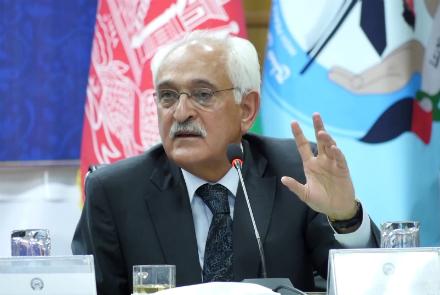Former national security advisor Rangin Dadfar Spanta said ongoing efforts for talks with the Taliban are done behind closed doors and that these efforts will not bring any results.
Addressing a consultative meeting between political figures and the High Peace Council, Spanta said the peace talks should be intra-Afghan and that the achievements of the past few years and the crimes which have been done by warring parties should not be ignored.
He said there is a possibility that Afghanistan will become a battle ground for major powers if the peace talks are not held between Afghans and if the Afghan government is not involved.
“We are going back to the situations back in the beginning of the 1990s. Meetings behind closed doors were held between major powers and the Taliban. Even the (Afghan) government was not present at the Geneva talks. In the current talks, the Afghan government is not present, neither are the Afghan people or representatives of Afghanistan. These talks are coming from a weak position between the US and the Taliban,” Spanta said.
The former national security adviser meanwhile said that Pakistan is still supporting the war in Afghanistan and that countries like Russia and Iran are in talks with the Taliban.
“Countries like Russian Federation, Islamic Republic of Iran as it is claimed by the Afghan government and Afghan officials and also countries like Republic of China, these countries are at least in talks with the Taliban. Therefore, peace efforts in Indonesia, in Uzbekistan, in Moscow, or bilateral talks between Taliban and US are portraying the reality that the international and regional consensus for support of the Afghan government and joining the fight against anti-government armed oppositions has broken,” said Spanta.
Despite that, the former national security adviser stressed the need for attention to be paid to justice in the peace process.
“The use of hate literature should be avoided. This is a good practice. This is about all the people of Afghanistan, about those who have stayed here over the past 40 years, about those who created a resistance against Taliban occupation, about those who set ablaze the grape gardens, about those who were massacred in Yakawlang, about those who were killed in Helmand bombardment, about those who were imprisoned in Bagram without sin. We should go towards peace with this morale,” Spanta added.
HPC officials meanwhile said that President Ashraf Ghani has started discussions about forming an authorized and inclusive delegation to handle peace talks with the Taliban.
“The involvement and coordination by the US as well as China, Russia, India and Britain are necessary. We are trying to have other countries’ consensus on peace,” said Akram Khpulwak, head of the HPC Secretariat.
This comes after a string of meetings by Zalmay Khalilzad, the US special envoy on Afghanistan’s reconciliation, during his visit to the region earlier this month. His first stop was Kabul and after wrapping up his trips to Pakistan, Qatar, UAE and Saudi Arabia, he returned to Kabul where he briefed the president on his discussions.

